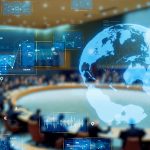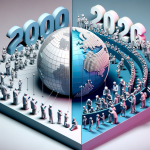Introduction
The modern news cycle is shaped by an unprecedented fusion of technological breakthroughs, shifting political landscapes, and expanding celebrity influence. These forces have merged to create a global environment where innovation dictates conversation, political decisions shape digital economies, and cultural icons wield extraordinary power over public discourse.
As societies adapt to rapid digital evolution, the convergence of these elements is redefining how the world interprets events. From AI-driven advancements to celebrity-led political conversations, the interplay of culture, governance, and technology has become a defining feature of the twenty-first-century narrative.
Technology and the Rise of Global Influence
Technological progress now determines a nation’s strategic value as countries invest heavily in AI systems, data infrastructures, and cybersecurity networks to secure global influence. This digital race has reshaped geopolitical priorities, emphasizing technological capability as a central pillar of national strength.
At the same time, private corporations have become powerful actors in global affairs. Their platforms drive communication, their innovations influence economies, and their algorithms shape collective consciousness. As power shifts from traditional institutions toward digital entities, the world navigates a new model of influence rooted in technological dominance.
Celebrities as Digital Activists in the New Era
Celebrity involvement in political and global issues has grown dramatically as public figures use digital platforms to amplify their voices. Their impact extends beyond entertainment as they champion environmental causes, advocate for humanitarian efforts, and weigh in on political debates with global reach.
This increasing involvement blurs the line between activism and influence. While some celebrities offer informed perspectives, others spark controversy by promoting polarized narratives. Their enormous visibility creates a new form of public authority that influences policy discussions, shapes audience behavior, and redefines how societies engage with global issues.
Political Reactions to the Digital Economy
The emergence of a powerful digital economy has required governments to modernize their policy frameworks. Digital currencies, cross-border data transactions, and tech-driven financial systems have forced political leaders to reconsider traditional economic models.
However, navigating this digital transformation is challenging. Policymakers must balance innovation with regulation, addressing concerns related to data privacy, economic inequality, and monopolistic behavior from major tech corporations. The digital economy has become a political arena where decisions made today will shape global financial stability for decades to come.
The Global Impact of AI and Social Media
Artificial intelligence and social media platforms now act as global gatekeepers of information. News spreads within seconds, public reactions evolve in real time, and narratives shift as algorithms optimize engagement. This interconnected digital ecosystem influences elections, social movements, and international diplomacy.
The impact of AI extends further into society, transforming industries through automation and enhancing capabilities across healthcare, education, and public administration. Yet these advancements raise concerns related to ethical standards, job displacement, and the spread of misinformation. Managing the dual nature of AI—its potential and its risks—remains a global challenge.
Innovation Meets Diplomacy: The New World Order
Diplomacy has entered a digital era where nations negotiate cybersecurity frameworks, AI regulations, and technological alliances. Political relationships increasingly depend on digital cooperation, with countries forming partnerships based on shared technological goals rather than historical ties.
This evolution represents a major shift in how countries assert influence. Technological alignment shapes the balance of power, with innovation serving as a diplomatic tool that strengthens alliances and enhances national leverage. As global tensions rise, digital diplomacy becomes essential to sustaining international stability.
Entertainment, Ethics, and Influence in the Tech Age
Entertainment and technology have merged to create a new platform of cultural influence. Streaming giants, digital creators, and online storytellers capture global audiences, shaping public perception on issues ranging from politics to technology ethics. The media landscape is now an arena where entertainment and information coexist seamlessly.
This convergence raises significant ethical questions. Digital content can influence political narratives, blur truth, and manipulate public opinion. Ensuring responsible storytelling and transparent content distribution has become vital for preserving the integrity of global information channels.
FAQs
How do technological breakthroughs affect global politics?
They shift political priorities, strengthen national capabilities, and influence international diplomacy through digital innovation and strategic competitiveness.
Why are celebrities increasingly involved in political discussions?
Their platforms give them global reach, allowing them to influence public opinion and shape conversations on major social and political issues.
How does the digital economy challenge traditional governance?
It forces policymakers to modernize regulations around data use, digital transactions, and cybersecurity while balancing innovation with public protection.
What role do AI and social media play in shaping public perception?
They influence what information people see, how quickly news spreads, and how audiences interpret global events through algorithmic personalization.
Why is digital diplomacy becoming more important?
Nations rely on technological cooperation to maintain security, economic stability, and international influence in an increasingly digital world.
Conclusion
The convergence of technology, politics, and celebrity culture is rewriting global narratives in remarkable ways. These forces shape how societies understand world events, influence national strategies, and alter the flow of global information. Their combined impact has created a complex ecosystem where digital power and cultural influence drive public engagement.
As this transformation continues, leaders and citizens alike must navigate the balance between innovation and responsibility. Ensuring transparency, fostering digital ethics, and promoting informed discourse will be essential to building a future shaped not only by progress but by integrity and global cooperation.





